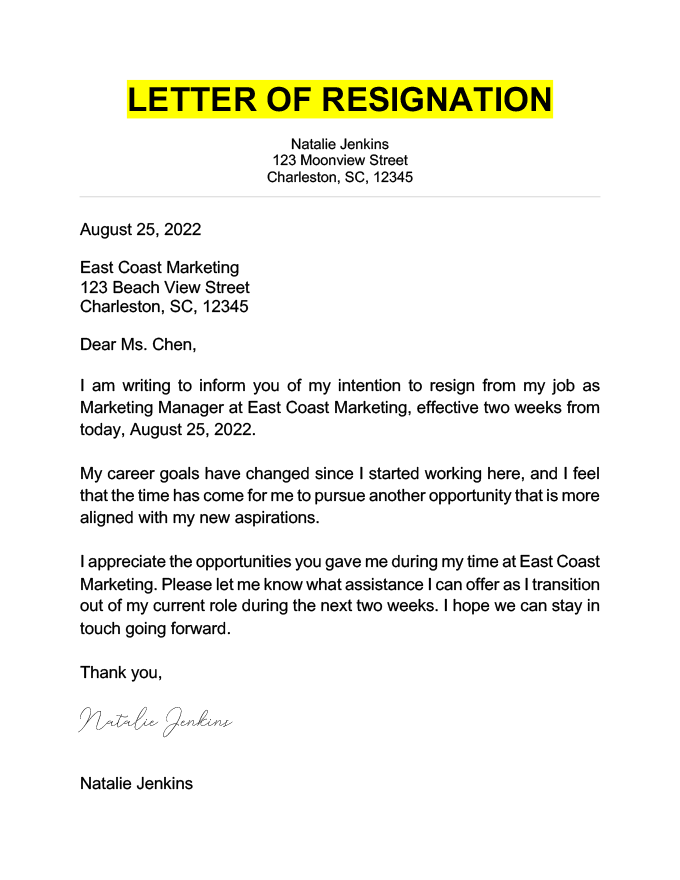Congratulations on your new job opportunity! There is nothing better than witnessing growth in your professional journey.
But before stepping into this new phase, you need to sort things out from your previous job role. The one important thing is resigning professionally and maintaining a positive relationship with your last company.
If you’re confused about how to communicate with your hiring manager or seeking simple tips regarding resignation, keep reading!
This blog will help you tackle the complexities of your resignation phase, from the resignation letter to the notice period. Furthermore, it will provide guidance for saying goodbye in a reputable manner.
Guide on How to Resign from a Job Professionally:
A resignation is a difficult yet courageous decision you have to make, whether it is due to finding a better job opportunity, leaving the town, or any other personal reason that exists.
In the professional world, leaving gracefully builds a lasting positive impact on the employer. This is especially crucial in today’s dynamic world, where recruiters are rapidly networking through platforms such as LinkedIn.
Let’s take a look at the right approach you need to take when you decide to resign from a job:
Resign Only For The Right Causes:
While leaving your job, you need to ensure that you’re doing it for the right reasons. Analyze the pros and cons of another job opportunity and then take a step. If the new job opportunity offers a better space to learn and grow, or if there is another reason.
You need to ensure that you think and provide a logical explanation for why you chose to leave. This can include commuting issues or finding another role contributing to your professional growth.
If there is a different kind of reason that will make them force you to stay, then you need to set a strategy for it. Just discuss how your resignation is crucial for stepping up in your career. There is no need to go into the details regarding other causes that made you leave.
Write The Resignation Letter:
Once you have decided how you will break the news and handle the response from your employer, start writing.
If you’re confused regarding how to write a resignation letter, a cover-letter writing service agency can help you with that.
You need to craft a professional resignation letter that mentions the following details:
- Start by professionally informing us that you are resigning from your role.
- Mention the motives behind your decision.
- Highlight the official date of your last day at work. Don’t forget to consider the duration of the notice period while finalizing the date.
- Share how grateful you are for the learning experience in the company. Appreciate the good things about the company and avoid talking about negative things.
- To demonstrate your dedication and contribution to the company’s continued success, you can offer to train your replacement in the letter.
- End with a positive note and wish them the best regards for keeping the doorways to future opportunities open.
Remember to keep the letter brief while covering every important point that is discussed above.

Study Your Job Contract:
Your job contract will contain all the information regarding the notice period. Moreover, it will contain all the other formal details you need to work on before leaving.
A notice period is usually 2-4 weeks. However, it may differ from company to company. You need to go through your job contract, where you will get to know about the agreed-upon duration.
Completing this timeframe with the company is necessary and will provide them with adequate time to find a replacement for your position.
Respectfully adhering to the signed agreement will make your leaving process easier and leave a good impression regarding your professionalism.
Communicate In Person:
The best way to let your manager know that you’re leaving is by talking to them face to face. In-person communications are the recommended way to disclose your departure news clearly. This step should be done before you submit your resignation letter.
This lets you have a more detailed conversation regarding your career goals and elevates your chances of leaving on good terms.
Other ways to communicate include emails or video calls. However, these are only effective and considered acceptable when your manager is working remotely or out of town. Just remember to use a respectful tone and prepare for any queries they may have for you.
Discuss Professionally:
This is one of the most significant things you need to consider while you’re ready to leave. Your previous employer will do their very best to stop you from leaving. You need to avoid giving them any reasons that they can convince you with.
Ideally, they will support your choice. Stay calm and confident in your decision without wavering if they express disappointment.
Moreover, they might try to reverse your decision by offering promotions or pressuring you to continue with the organization. You can give it a thought if the opportunity aligns with your career objectives.
However, if you’re firm with your decision, you need to explain it politely and keep the conversation short.
Talk Positive Only:
Professionalism demands conversations that are free of negative feelings or harsh experiences. When leaving a company, try to discuss the benefits your career will get with the new job role. Avoid discussing the disappointments you faced from your workmates or the company.
This will leave a positive image of you as a professional who humbly said goodbye.
Transition Plan During The Notice Period:
While you’re on the edge of stepping out of the company, the notice period will be a crucial phase. It will reflect your professional capabilities and ease the onboarding process for the next employee.
Here is what you need to do while transitioning:
- Complete your pending work.
- Highlight the responsibilities of your role so the new employee can pick off smoothly.
- Mention any significant projects that need to be finished after you’re gone.
- Add the contact details of the important people associated with the job role.
Inform Your Coworkers:
After getting done with the official documentation and handing the resignation letter to your boss, you need to tell your coworkers. Disappearing without letting them down will weaken the positive relationships you have built over time.
Instead, you need to properly let them know about your professional endeavors and keep networking opportunities open with them.
Staying in touch with coworkers can help you progress in your career and increase exposure to related job roles as well.
FAQS:
How do I politely resign from a job?
Inform professionally. Start by giving a reason that is related to your career growth. Let them know about your last day at work and show gratitude for the working opportunity.
What not to say while resigning?
Never discuss any dissatisfactions you had with the company or your colleagues. Avoid getting emotional and use a professional tone.
Is it OK to resign from my job?
Resigning from your job might feel confusing. But go ahead if you’re doing it for the right reasons, including mental peace, growth, and achieving new goals. You should always be open to trying new roles.
Final Word:
Resigning from a job role and moving towards a better job opportunity may seem like an intimidating task. However, it is worth it and equally important for your growth. All you need to do is be confident while maintaining professionalism and respect.
Just face your manager in person, be ready with a well-structured resignation letter, and complete your notice period. And you’re all ready to leave gracefully!

